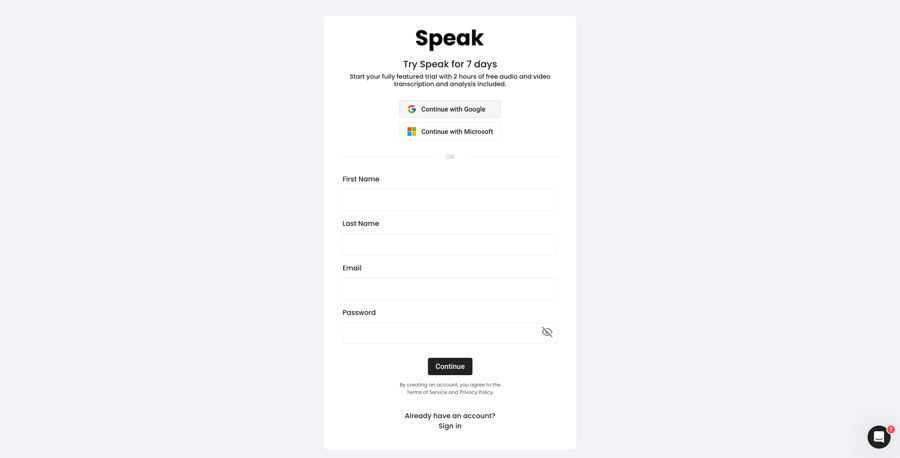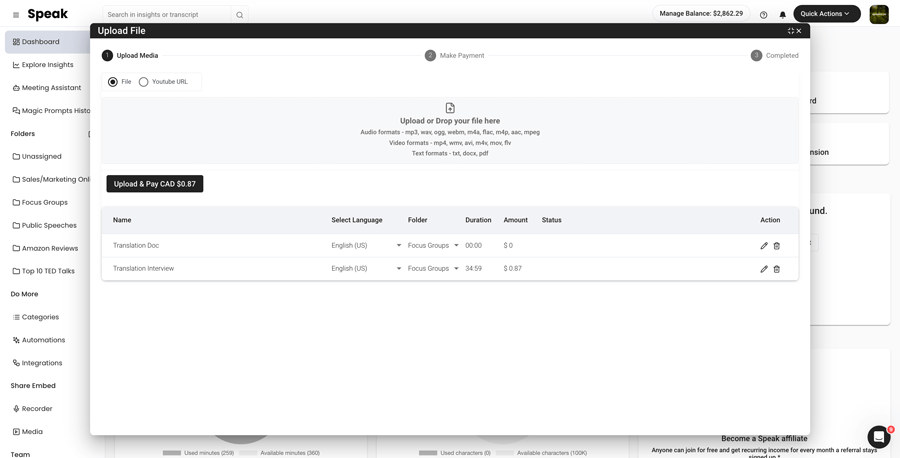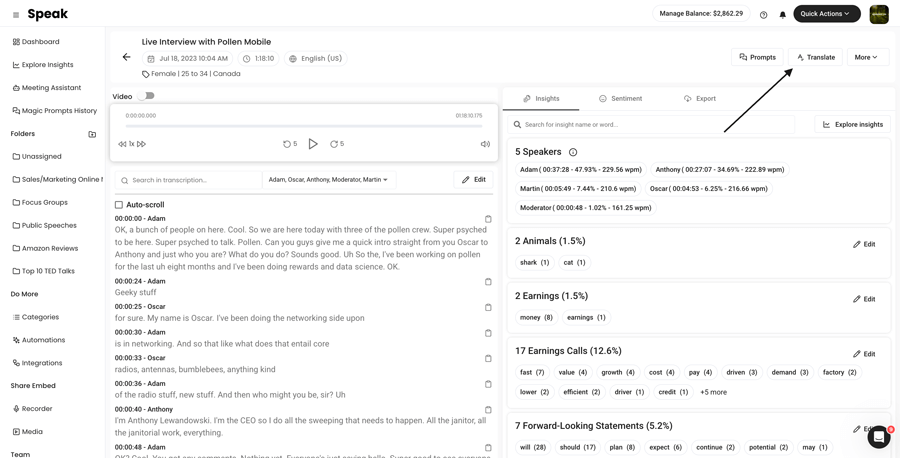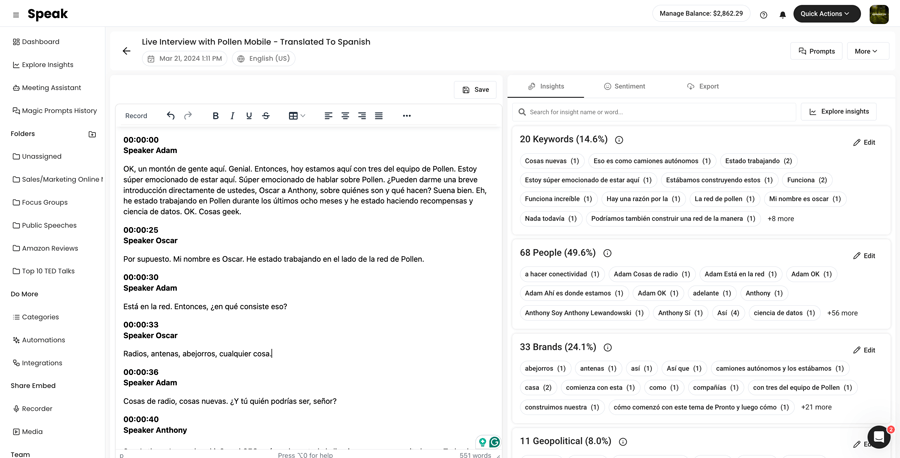How To Translate Japanese to Portuguese (Brazilian)
Translating Japanese to Portuguese (Brazilian) is super simple!

Step 1: Register for Speak
Register for Speak using this link.
Once you register, you can instantly begin translating your Japanese to Portuguese (Brazilian) file(s).

Step 2: Upload Your Japanese file(s)
As soon as you log in, you will be redirected to the dashboard.
Once there, you can select the Quick Action "New Upload".
In Speak, you can seamlessly upload, transcribe and translate audio, video and text files all at once!

Step 3: Translate Your Japanese file(s) to Portuguese (Brazilian)
Once the file is uploaded, simply visit your file and select "Translate".
If it is an audio and video file, Speak will ask you if you want to keep the speaker names and timestamps in the translation.
Want to translate many files at once? No problem!
You can view the files you want to automatically translate from Japanese to Portuguese (Brazilian) from the folder level and instantly translate as many files as you need with our artificial intelligence translation in just a few clicks.

Step 4: That's It! View, Analyze, Modify & Export Your New Portuguese (Brazilian) file(s)
Once the translation is done, you will be alerted and you will see a new document in the same folder your original file is in.
The file will be named the same but with a dash indicating that it is the translated version.
Need support with your Japanese translation?
We are always here and happy to help at Speak!
Just send us a message on live chat on the bottom right corner and we will ensure you are set up for success.
Interested in translating Japanese or other languages to different languages? View our entire list of supported translation languages here.
Automatic, accurate, instant AI translation from Japanese to Portuguese (Brazilian) is here for you.
Register for Speak using this link and begin translating Japanese to Portuguese (Brazilian) today.
The Power of Bridging Cultures: Translate Japanese to Portuguese (Brazilian)
With globalization shrinking distances and digital technologies erasing borders, the ability to communicate across languages is more valuable than ever. In this light, translating Japanese to Portuguese (Brazilian) is not just about converting words; it's about connecting worlds. Whether you're a researcher diving into cross-cultural studies or a business aiming to expand in international markets, leveraging ai translation and automatic translation technology can set you miles ahead on your journey.
Unlocking Business and Research Opportunities
In today’s fast-paced global economy, the ability to swiftly and accurately translate between Japanese and Portuguese (Brazilian) can be a game-changer for businesses and researchers alike. Speak Ai's cutting-edge translation tools, powered by the latest advancements in NLP and large language models, offer unparalleled benefits:
- Immediate access to accurate Japanese to Portuguese (Brazilian) translation, ensuring clear communication.
- Substantial time and cost savings over traditional translation services.
- Enhanced ability to analyze and visualize data across languages, making insights more actionable and impactful.
From expanding your business in new markets to conducting cross-cultural research, the potential applications and benefits are wide-reaching.
Why Translate Japanese to Portuguese (Brazilian)?
The decision to focus on translating between these two languages is not arbitrary. Both Japanese and Portuguese (Brazilian) play significant roles in their respective regions, influencing culture, economy, and technology. Let's explore the relevance of these languages further.
Geographical and Demographical Insights
Japanese is more than just Japan's national language. With over 125 million speakers, it's a key player in Asia, signifying cultural richness and technological innovation. Meanwhile, Portuguese has established Brazil as its fortress, with around 209 million speakers immersed in a melting pot of cultures that amalgamates indigenous traditions with Portuguese influences.
Historical and Cultural Linkages
Interestingly, the relationship between Japan and Brazil is profound, marked by a century-old history of migration and shared cultural exchanges. This has created a unique blend of communities fostering business collaborations and academic partnerships between the two countries.
Business and Economic Collaborations
A deeper understanding, facilitated by seamless translation, can unlock numerous opportunities in trade, technology transfer, and innovation, fostering growth in both Japanese and Brazilian markets.
Transforming Translation with Tech: Speak Ai's Unique Solution
At Speak Ai, we are proud to offer a translation solution that stands out in the crowded market of language services. Our AI Meeting Assistant, capable of automatically transcribing and analyzing meetings in both Japanese and Portuguese (Brazilian), exemplifies the potential of AI in overcoming language barriers. Here’s what sets us apart:
- Integration with Major Platforms: Our Assistant joins meetings on Microsoft Teams, Zoom, Google Meet, and Webex, providing real-time, accurate translations.
- Automatic Analysis: Leveraging large language models to analyze content, we offer valuable insights that would otherwise take hours to derive manually.
- Data Visualization: Translated data is not just text. Our platform visualizes the information, allowing for easier interpretation and decision-making.
With a stellar 4.9 rating on G2 and a community of over 150K users, Speak Ai is at the forefront of revolutionizing how we think about and utilize translation technology.
Conclusion
As the world becomes increasingly interconnected, the importance of effective communication across languages cannot be overstated. By translating Japanese to Portuguese (Brazilian), we bridge cultural and economic divides, fostering better understanding and collaboration. Speak Ai is committed to driving this transformation, equipped with advanced AI, NLP, and a suite of tools designed to break down language barriers.
Join us on this journey. Embrace the future of communication with Speak Ai.
Now, addressing the specific questions:
Locations Where Japanese and Portuguese (Brazilian) are Popular
Japanese is predominantly spoken in Japan, home to its entire native speaking population. However, significant communities of Japanese speakers can be found in the United States, particularly in Hawaii and California, as well as in Brazil, Peru, and the Philippines due to historical migration.
Portuguese (Brazilian), meanwhile, is primarily spoken in Brazil, the largest country in South America, making it the world’s epicenter of Portuguese language in its Brazilian dialect. Small communities of Brazilian Portuguese speakers can also be found in countries with strong immigration ties to Brazil, such as the United States, Paraguay, and Japan.
Fun Facts about Japanese and Portuguese (Brazilian)
- Despite its vast array of dialects across regions in Japan, the standard dialect taught in schools and used in media is Tokyo-style Japanese.
- Brazilian Portuguese is known for its musicality and rhythm, heavily influenced by African, Indigenous, and other European languages apart from Portuguese.
Differences and Similarities between Japanese and Portuguese (Brazilian)
On the surface, Japanese and Portuguese (Brazilian) could not appear more different, with distinct writing systems, phonetics, and grammatical structures. Japanese uses a combination of three scripts—Kanji, Hiragana, and Katakana—while Brazilian Portuguese uses the Latin alphabet. Phonetically, Japanese is syllable-timed, while Portuguese is stress-timed, affecting the rhythm and pace of speech.
However, both languages share an intriguing similarity in their absorption and adaptation of foreign words. Japanese often incorporates English and Chinese words, adapting them to its phonetic system. Similarly, Brazilian Portuguese has assimilated words from Tupi-Guarani, Italian, German, and English, reflecting the country's diverse cultural history.
This blend of languages enriches both cultures, making the translation between Japanese and Portuguese (Brazilian) not merely a linguistic task but a cultural journey. Speak Ai's translation technology is designed not just to navigate these complexities but to embrace and celebrate them.
Translate Japanese To These Other Supported Languages:
- Translate Japanese-to-Arabic (Egypt)
- Translate Japanese-to-Arabic (Iraq)
- Translate Japanese-to-Arabic (Israel)
- Translate Japanese-to-Arabic (Jordan)
- Translate Japanese-to-Arabic (Kuwait)
- Translate Japanese-to-Arabic (Lebanon)
- Translate Japanese-to-Arabic (Oman)
- Translate Japanese-to-Arabic (Palestinian Authority)
- Translate Japanese-to-Arabic (Qatar)
- Translate Japanese-to-Arabic (Saudi Arabia)
- Translate Japanese-to-Arabic (Syrian Arab Republic)
- Translate Japanese-to-Arabic (United Arab Emirates)
- Translate Japanese-to-Arabic Modern Standard (Bahrain)
- Translate Japanese-to-Armenian
- Translate Japanese-to-Bulgarian
- Translate Japanese-to-Catalan
- Translate Japanese-to-Chinese (Cantonese, Traditional)
- Translate Japanese-to-Chinese (Simplified)
- Translate Japanese-to-Chinese (Traditional)
- Translate Japanese-to-Croatian
- Translate Japanese-to-Czech
- Translate Japanese-to-Danish
- Translate Japanese-to-Dutch
- Translate Japanese-to-English
- Translate Japanese-to-English (Australia)
- Translate Japanese-to-English (India)
- Translate Japanese-to-English (Ireland)
- Translate Japanese-to-English (New Zealand)
- Translate Japanese-to-English (Scottish)
- Translate Japanese-to-English (South African)
- Translate Japanese-to-English (United Kingdom)
- Translate Japanese-to-English (United States)
- Translate Japanese-to-Estonian
- Translate Japanese-to-Farsi
- Translate Japanese-to-Finnish
- Translate Japanese-to-French
- Translate Japanese-to-French (Canada)
- Translate Japanese-to-German
- Translate Japanese-to-German (Swiss)
- Translate Japanese-to-Greek
- Translate Japanese-to-Gujarati
- Translate Japanese-to-Hebrew
- Translate Japanese-to-Hindi
- Translate Japanese-to-Hungarian
- Translate Japanese-to-Icelandic
- Translate Japanese-to-Indonesian
- Translate Japanese-to-Irish
- Translate Japanese-to-Italian
- Translate Japanese-to-Japanese
- Translate Japanese-to-Kannada
- Translate Japanese-to-Korean
- Translate Japanese-to-Latvian
- Translate Japanese-to-Lithuanian
- Translate Japanese-to-Malay
- Translate Japanese-to-Malayalam
- Translate Japanese-to-Norwegian
- Translate Japanese-to-Persian
- Translate Japanese-to-Polish
- Translate Japanese-to-Portuguese
- Translate Japanese-to-Portuguese (Brazilian)
- Translate Japanese-to-Portuguese (Portugal)
- Translate Japanese-to-Romanian
- Translate Japanese-to-Russian
- Translate Japanese-to-Slovak
- Translate Japanese-to-Slovenian
- Translate Japanese-to-Spanish
- Translate Japanese-to-Spanish (Mexico)
- Translate Japanese-to-Swedish
- Translate Japanese-to-Tamil
- Translate Japanese-to-Telugu
- Translate Japanese-to-Thai
- Translate Japanese-to-Turkish
- Translate Japanese-to-Ukrainian
- Translate Japanese-to-Vietnamese



